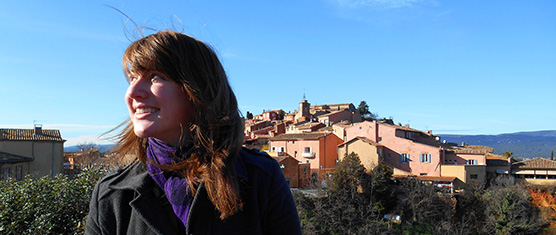
While Tara Miller studied at the American University Center of Provence last spring, she carried out a research project on French attitudes towards nuclear power. She noted that “France currently gets over seventy-five percent of its electricity from nuclear power, more than any other country in the world, and significantly more than the United States’ nineteen percent.” Then set out to explore the questions, “But is this difference due to a fundamental difference in opinion regarding nuclear energy, or a difference in societal structure and governing strategies? Do the French people support the widespread use of nuclear energy or merely tolerate it?” Here are some excerpts from her study:
At the International Thermonuclear Experimental Reactor (ITER) in Saint-Paul-lez-Durance, the front desk person responded to why “she thought nuclear energy is so uniquely successful in France. She said “that it is both less polluting and less expensive for the consumer. In response to my inquiry about the impact of the nuclear facilities on the town of Saint-Paul-lez-Durance, she expressed that the facilities were beneficial because they brought work. She thought that the people of Saint-Paul-lez-Durance were not particularly worried about living so near to the nuclear facilities. Finally, she believed that the opinions of the French concerning nuclear energy were different and varied.”
At the Atomic Energy Commission (CEA) Cadarache Center, she took at tour where the guide, “told us about various economic and safety aspects. CEA Cadarache employs 4,500 people, including regular employees, subcontracted firms, and research collaborators. Safety precautions cover everything from controlled access to the site and radioprotection of employees to containment of nuclear waste and rigorous emergency plans in the case of an accident. On the way out, I picked up a brochure that reported the results of a public opinion survey. Risk of a nuclear accident was only considered the fifth most likely threat, after flooding, forest fires, heat waves, and earthquakes.”
The nuclear plant in Thionville was closed the day she traveled to northeast France, but the locals’ comments revealed various opinions. “One woman was very happy to have the facility there, explaining that it provided clean energy with less pollution, and she was proud that France used so much nuclear energy. Another woman said that the nuclear center was good because it created so many jobs for locals. The last person that I talked to was a little more hesitant, saying that nuclear energy was good as long as there were not incidents like Fukushima.”
In conclusion, Tara discovered “that the issue of nuclear energy is much like any other – everyone has their own opinion, across the spectrum from enthusiastic support to outright opposition. Environmental concerns, both on the side of clean energy and the side of radioactive pollution, were frequently expressed. Nevertheless, the more decisive component appeared to be the economic concerns, including energy costs and job creation. An atmosphere of mild support appears to prevail, but it is likely that the success of nuclear energy in France is more the consequence of economic factors and a strong central government than overwhelming popular support.” Friedberg Travel Fellowship Report 2014